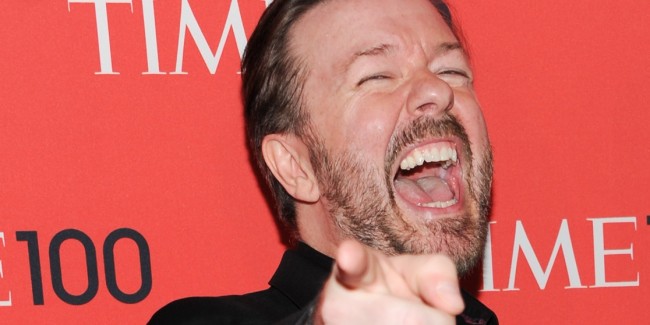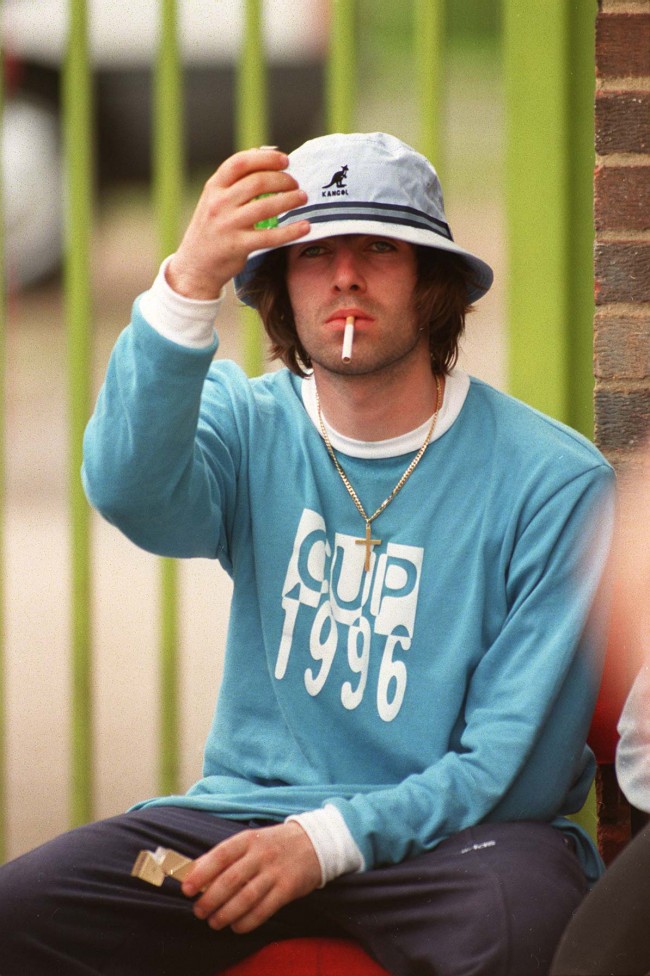Celebrities Category
Celebrity news & gossip from the world’s showbiz and glamour magazines (OK!, Hello, National Enquirer and more). We read them so you don’t have to, picking the best bits from the showbiz world’s maw and spitting it back at them. Expect lots of sarcasm.
Three Chick Discs: Disco Era Threesomes For Your Listening Pleasures
IN the disco era there began a phenomenon of immense historical insignificance: the emergence of all female musical trios. Sure, there had been The Supremes, and there were various disco/soul trios that genuinely kicked ass (etc. The Three Degrees, Labelle), but these bands were different. This new breed was basically talentless, and exuded an overt sexuality (i.e. they couldn’t sing, but at least they were hot). Every song in their entire catalog (with 0.00 exceptions) was about sex, and every performance and music video operated unflinchingly to the “sex sells” approach.
The trend extended into the 1980s, paving the way for groups like Destiny’s Child (who were less one-dimensional). Largely forgotten in the annals of pop history, all that remains are the vinyl relics which I hereby dub “Three Chick Discs”. Here are a few examples
“Make Love Whenever You Can” by Arabesque

Make love: Do it today, don’t wait until tomorrow
Make love: The only way to wipe away your sorrow, love
Read the rest of this entry »
Posted: 6th, March 2014 | In: Flashback, Key Posts, Music | Comment
The World in My Window: A Select Filmography of the Space Shuttle

ALTHOUGH Alfonso Cuaron’s blockbuster film Gravity (2013) earned a whopping seven Academy Awards last Sunday night, one crucial supporting player didn’t pick up the Honorary Oscar it so clearly deserved: NASA’s space shuttle.
For thirty-five years now, this durable “space truck” — known officially as the “Space Transportation System” — has appeared in many space movies of the contemporary or realistic variety.
Read the rest of this entry »
Posted: 6th, March 2014 | In: Film, Flashback, Key Posts | Comments (3)
Iggy Pop Wants A Kettle, Bob Hope And Fat People From Miami: The Tour Rider In Full

IGGY Pop, star of one of the greatest rock photos of all time, the man who faked Lou Reed’s death, Richard Wilson look alike, ToTP teddy molester, performer of the most revered failed stage dive, the man for whom the show did not always go on, has created one of the most memorable tour riders for his shows.
Well, Pop’s road manager Jos Grain has, as The Smoking Gun reports on the “Marvellous and Most Instructive Information Document…. Including Utterly Confusing Comments and Asides.”
The 2006 rider , has been followed by the 2012 tour.
Read the rest of this entry »
Listen To All Parts Of Robert Ashley’s Perfect Lives – The Televised American Opera
ROBERT Ashley (1930-2014). The composer was 83.
Kyle Gann, who recently wrote a biography said of the Michigan-born composer, who in 1958 created the Cooperative Studio for Electronic Music , a pointer to his eperiments with audio synthesis.
“Bob was one of the most amazing composers of the 20th century, and the greatest genius of 20th-century opera. I don’t know how long it’s going to take the world to recognize that.”
Thanks to the internet, the past never goes away. You can hear some of Ashley’s work in full.
In 1997, he spoke to Furious:
PSF: How did you decide to make your works as all being operas?
In 1975, there were no operas in America. I was interested in opera and it seemed to me that the only possible theatre for contemporary opera would be television. So I started working towards a kind of television kind of opera. I started designed the work so that it would be usable on television. I think it’s still true.
PSF: How did you see television as an ideal medium for operas?
It’s contemporary. It’s new. Many more people watch television than go to opera houses. There aren’t any opera houses in the United States. The possibilities for contemporary opera are very small. I thought when I started, it looked more promising (to work with television). Now, in the last few years, television has become much more conversative. But I still think there’s going to be a marriage of television and some form of opera. It might not happen in my lifetime but I still think it’s inevitable. The whole idea of the opera house is so dated anyway. It’s such a nineteenth century idea. Because of that probably, there aren’t any to speak of (maybe 3 or 4). It doesn’t really allow the idea of opera to really grow. I thought if I could get television interested in opera, it would make a kind of new thing that would allow composers to build a whole new repertoire.
It was more promising fifteen or twenty years ago than it is now. The first opera I did, Music With Its Roots in Ether (1976), has been broadcasted a lot. The next one I did, Perfect Lives (1980), was produced by Channel 4 in Great Britian and was shown there for two years and then throughout Europe but only parts of it have been broadcast in the United States. Now in ’97, television is so conserative that it doesn’t look promising. But I think it’ll change back. I think it’ inevitable that there has to be some new genre in television. Television goes through these periods of incorporating new things. First there was live comedy then there were soap operas then there was news and now there’s a lot of television about sports. We went through a period of MTV with pop music videos too. Television always needs new materials and it’s just a matter of time until there’s the right audience for new work that’s not just pop music. When that happens, it’ll be a very good time for composers to do serious big, narrative pieces.
PSF: Why do think there has been resistance to this kind of idea in American television?
Because they’re stupid I guess. Opera on television in Europe is very important. If you think about it in the broadest sense: a lot of the dramas made in India with music are practically operas. They’re not sung but they have a very big appeal. I don’t know why American television people are so stupid but at the moment, they just seem to have some sort of a block. They just do what they do and they do it for a certain number of years. Then it wears out and they try something else. It’s just a matter of time I think.
Brian Robison, of Cornell University, has posted on YouTube 4 American Composers, directed by Peter Greenaway in New York in 1985.
Compared to Meredith Monk and Robert Ashley, John Cage and Philip Glass are household names, yet their relative fame frequently turns on the persistence of misconceptions. All too often, even scholars who might be expected to know better portray Cage as either charlatan or nihilist. Critics in the 1980s tagged Glass’s music as “classical music for people who don’t like classical music,” suggesting his shrewd exploitation of the yuppie market. Director Peter Greenaway and producer Revel Guest weave representative musical excerpts with interviews to present the personalities more accurately, and, in so doing, establishes a broader context for listening. Perhaps the most striking revelation of these documentaries is that such notorious iconoclasts are so soft-spoken in person (compared to the shy, halting Ashley, the loquacious Monk seems downright assertive).
Ashley’s TV opera Perfect Lives was reviewed by Frieze:
As living and breathing musicology in practice, Perfect Lives explores how storytelling creates music and – tangentially – how American social models grew in tandem with musical forms from Europe and Africa. Built into the very structures of how it was written and is performed – there is no definitive score, only the libretto, some diacritic and harmonic indications, and a set of intricate time signatures to follow – Perfect Lives is about the sociability of music. Ashley realized Perfect Lives over a period of years with a number of close collaborators. (‘I only work with geniuses,’ he says. ‘In the end it pays off.’5) In a documentary made by Peter Greenaway in 1983, as part of his ‘Four American Composers’ series, Ashley said he wanted to ‘allow the performers to make musical statements as unpremeditated as speech itself’.
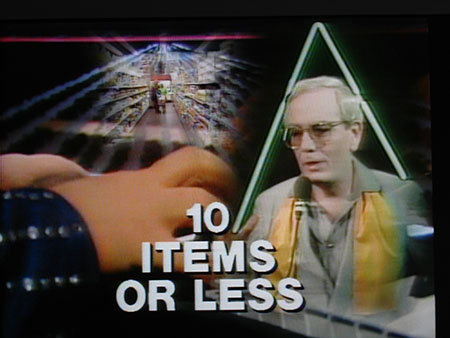
Ashley spoke with Alex Waterman:
What distinguishes traditional opera from any other form of narrative—like religious dramas, for example—is that most operas have a political landscape. This is especially true in Italian and German opera. You get a version of a landscape that has political meaning. I thought about that when contemplating the architecture of the opera house and how it makes those landscapes possible. Of course, that architecture is not available to me, nor would I want it to be. But the landscape has to be there however the opera is presented.
In the best of circumstances, the architecture and the music–for the people—match. But what’s happened in the last 50 to 100 years is that the music has outgrown the architecture. The instruments are old, the ideas are old—everything’s so old; it’s boring, you know? There is no architecture to deal with what we’re talking about here. I thought, There’s got to be one. And it occurred to me that our architecture might be the imaginary space behind the surface of the television screen. In other words, when you watch TV, you see whatever you see, but behind that there’s an imaginary space and maybe that’s the place for the music of our time.
It’s interesting how you can manipulate landscapes with television so that they have meaning. It’s different from having a person singing here, in my living room, which is something of a landscape. If you go outside of the personality of this room, the landscape is all of a sudden dramatically political—it’s a visual demonstration of how things work for everybody. That’s what opera is about. You’re trying to put the story in an appropriate place so that when you see it you say, Oh, that’s what the story is about!…
The landscape in Perfect Lives starts as big as possible, in The Park, and it’s described quite precisely in political terms. And then it goes to The Supermarket, which is not totally indoors. Then you get the ride through the landscape with the lovers eloping and the bank robbers driving to Indiana in The Bank episode, where you are dealing with mixed outdoors and indoors. Next, you enter the most close-range landscape, in The Bar with Rodney and Buddy talking. Then you move out again to a bigger space in The Living Room, which has more imaginary space. At the beginning of that episode, the characters talk about the Sheriff’s Wife as if she were on the South Pole and the Earth were revolving around her.
It is relentless. And mesmeric.
I.The Park (Privacy Rules)
II. The Supermarket (Famous People)
III. The Bank (Victimless Crime)
IV. The Bar (Differences)
V. The Living Room (The Solutions)
VI. The Church (After the Fact)
VII. The Backyard (T’Be Continued)
1.
2.
3.
4.
5.
9:00pm “The Living Room” from Varispeed Collective on Vimeo.
6.
5:00pm “The Church” from Varispeed Collective on Vimeo.
7. The Backyard
Janet Street-Porter Presents The Clash And The Sex Pistol’s First TV Show To Londoners In 1976
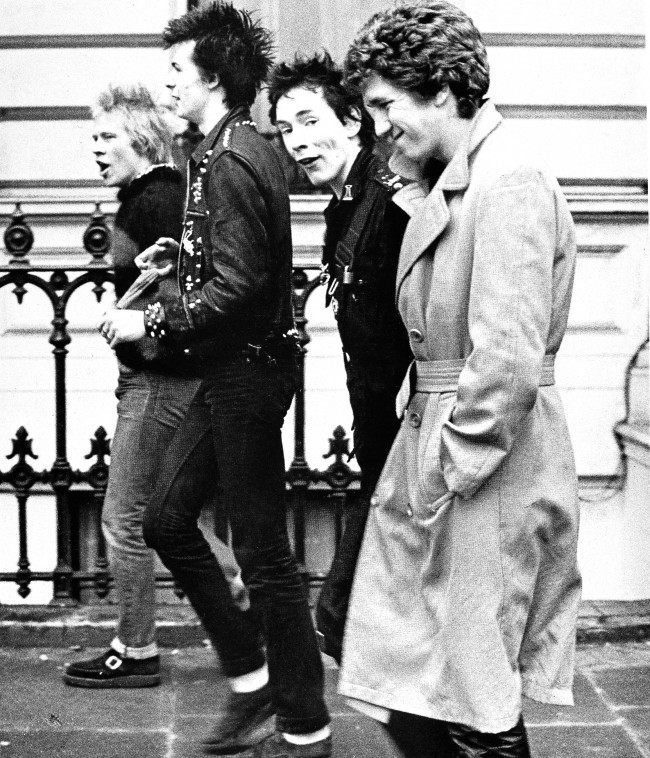
British punk rock band the Sex Pistols are seen in 1977. From left to right: Paul Cook, Sid Vicious, Johnny Rotten and Steve Jones.
IN November 1976, The London Weekend Show, introduced by Janet Street-Porter, took punk to the masses.
Read the rest of this entry »
The Stars That Come Out To Support BBC Three Are The Reason It Should Close
THE BBC is a wonderful thing and this writer will defend it forever. That said, not everything it does is perfect. Take a look at BBC Three for example, which is currently being scrutinised now that Auntie has said it might be closing it down forever and ever amen. Or, at lease, turning it into an online channel.
A BBC spokesman said “nothing is off the table”, adding “no decisions have been made”, but really, it must be nigh on impossible to justify the existence of BBC Three (and Four for that matter), when they only broadcast for half the day (seriously – what is with that) and for the main part, are furiously unpopular.
In the case of BBC Four, the handful of decent shows they make could easily be shown on BBC Two. And BBC Three? Well, there’s little to save from the cull. And the stars that are calling for the channel to remain underline why it needs to go.
Jack Whitehall, Matt Lucas and Russell Kane are amongst those showing support for BBC Three.
Read the rest of this entry »
Posted: 5th, March 2014 | In: Celebrities, TV & Radio | Comment (1)
The Top 15 Scariest Dolls of Cinema and Television
THERE is just something inherently creepy about a doll coming to life. I think it falls into the same category as clowns, kids and the elderly. Because they are supposed to be so benign or innocent, it becomes all the more warped and vulgar when they take a bloodthirsty bent.
The devil doll trope didn’t start with Chucky. In fact, you could go back centuries via fairy tales and the golem mythology. In terms of cinema, you could start with The Devil Doll (1936) or Dead of Night (1946). However, we’ll concentrate on films from the 1970s and adjacent decades.
So, here are the top demonic doll movie moments from the 1960s through the 80s. If there’s any egregious omissions, please fill me in, and let’s make this list grow!
15. CHILD’S PLAY (1988)

Woefully cheesy, this film just doesn’t do anything for me. However, I recognize it’s earned its place on the list of evil dolls, so here’s Chucky. Moving right along….
Read the rest of this entry »
Posted: 5th, March 2014 | In: Film, Flashback, Key Posts, TV & Radio | Comments (7)
David Brent To Play Live Shows
LIKE him or not, Ricky Gervais has managed to forge himself a career where he can do exactly as he pleases. Films? Sure. Children’s books? Done. Animations of podcasts he did ages ago? Fine. Making a star out of his mate by sending him on holiday? Remarkably, yes.
And now, Gervais has announced two David Brent concerts.
The comedian is going to get into his most famous character and appear on stage at London’s Hammersmith Apollo and Oxford New Theatre this May.
Read the rest of this entry »
Posted: 4th, March 2014 | In: Celebrities | Comment
Kurt Cobain’s Old Roomie Is Flogging His Old Stuff Online
AS well you know, Kurt Cobain is dead. He blew his mind out in a plaid shirt and a lot of people lost their favourite singer. It was terribly sad and inspired a lot of people.
Inspired them to do what? Well, try and make money from Cobain’s corpse mainly.
And so, to Kurt’s old roommate who says he’s selling a load of the deceased Nirvana shrieker’s belongings on Craigslist. Y’know, to save you from actually having to graverob in the first place.
Read the rest of this entry »
Posted: 4th, March 2014 | In: Celebrities | Comment
Rachel Johnson Discovers The Poor On A London Poverty Safari: London Mayor’s Sister Finds UK’s Lost Tribe
THE Times reports on Rachel Johnson, sister to London mayor Boris Johnson. She’s been on a Poverty Safari. Yes, those darling poor London wildings have been viewed:

Spotter: @Fatima__Ayad
Posted: 4th, March 2014 | In: Celebrities, Money | Comment
Charlie Chaplin Is Knighted: March 4 1975
ON March 4 Charlie Chaplin was knighted.
He had met The Queen in 1952.
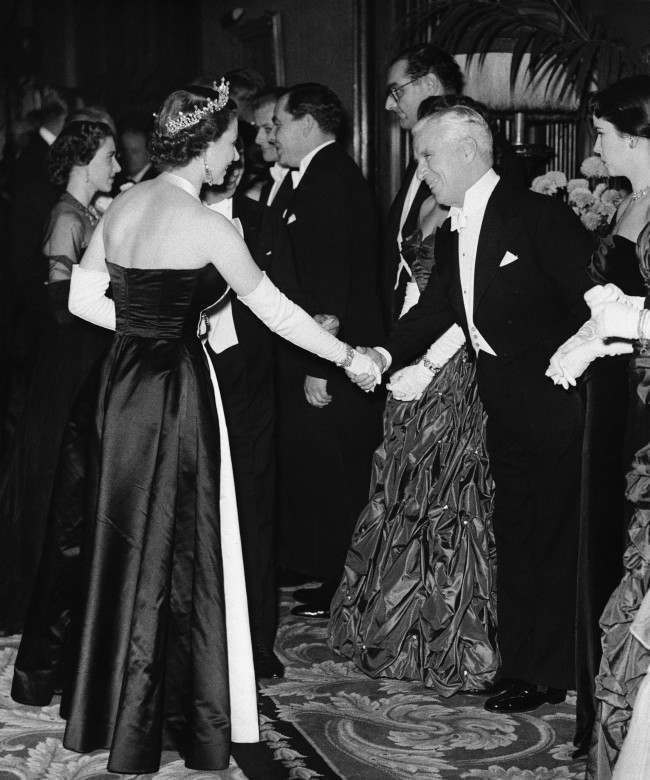
Queen Elizabeth II shakes hands with actor Charles Chaplin during meeting in Empire Theatre, London, for the Royal Film Performance, a benefit performance to aid the Cinematograph Trade Benevolent Fund. At left in background is Princess Margaret and at extreme right is Mrs. Oona Chaplin. Others are not identified. The movie shown was “Because You’re Mine,” marking first time that a musical from Hollywood had been chosen for this top British movie event. Chaplin, who was in London for recent premiere of his own new film, made a short appearance during hour-long stage show accompanying the movie presentation.
Date: 27/10/1952
Read the rest of this entry »
Posted: 4th, March 2014 | In: Celebrities, Flashback | Comment
Jake Bugg Predictably Slags Off TV Talent Shows
WHETHER you like it or not, the only music format that doesn’t seem to want anything to do with the working classes, is indie. Prick your ears up during an interview with almost any new British rock band, and you’ll not hear an accent amongst them. Pop, rap, metal and dance music meanwhile, are the playground for anyone who fancies it.
In the pop world, The X Factor, American Idol and Britain’s Got Talent are giving working class performers a shot at fame. Susan Boyle is a megastar, when no record company would touch her. Little Mix meanwhile, are a hotchpotch of regional accents (and most importantly, killer pop records).
Indie, meanwhile, looks like prog in the 70s, filled with a load of dreary, earnest humans who lack the hunger of someone like Oasis. Whether you liked the band or not, the urgency and desire in their early records was difficult to rail against.
Read the rest of this entry »
11 Examples That Prove Not Everything’s Better With Yakety Sax
CAN EVERYTHING be made better with Yakety Sax, even a Benny Hill sketch?
Homer “Boots” Randolph III ‘s 1963 record is a joyous thing. (That’s him below.) Originally released as the flip side to Boots’ first single release Percolator, it’s been an enduring hit.
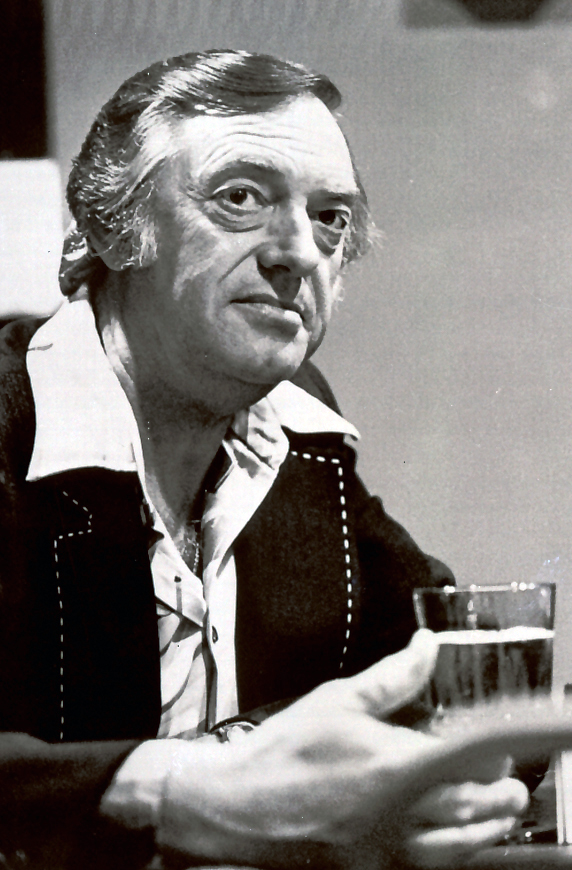
Can the song add humour to the humourless?
Black Metal
Dutch Trance
Ben Hur
Shrimp
Star Wars
Take it away, Homer:
And Chet Atkins, who turned the Sax into Yakety Axe (geddit?)
And if you want to sing along with Mark Knopfler, you can:
To prove that the Sax thrashes the axe (ann the piano – who asked for the piano?):
And with a silent movie soundtrack slant:
Finally, here’s Benny Hill. No, not with Yakety Sax. Even he tired of it:
Liam Gallagher Tells Oasis Fans Not To Buy Oasis LPs
NOT one for mincing his words, Liam Gallagher has told Oasis fans that they shouldn’t buy the forthcoming reissue of the group’s debut LP Definitely Maybe.
Why? Well, on Twitter, Our Liam got his one typing finger out, made sure caps lock was on, and said:
“HOW CAN YOU REMASTER SOMETHING THATS ALREADY BEING MASTERED.DONT BUY INTO IT.LET IT BE LG X”
Read the rest of this entry »
In 1978 Sonny And Cher Were Advertising The Bible
IN the November 28, 1970 issue of TV Guide Sonny and Cher were cheering for The Bible:
The people who make music today read the Bible. It’s that kind of book. It can make things work for you. Read the Bible. Find out where all the music is coming from.
And if you don’t have a Bible of your own, we’ll send you one for only a dollar. Hard cover and everything. Just one should do it. The Bible lasts a long time.
Spotter: EricAlper
Posted: 3rd, March 2014 | In: Celebrities, Flashback | Comment
May The Verse Be With You: ‘70s Star Wars Music
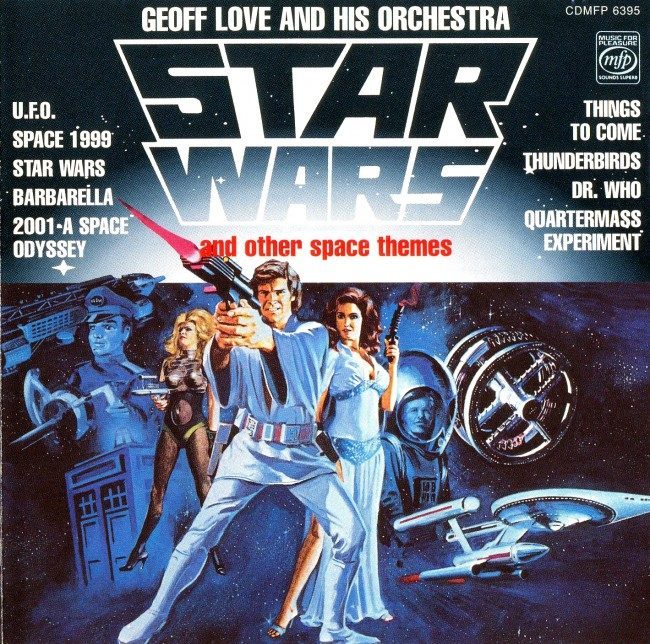
IN 1977, the entire planet was foaming at the mouth for anything Star Wars. The frenzy continued for several years with piles of Star Wars products flooding the stores daily. It seemed all you needed to do was bear a passing resemblance to the film or utter the words “star” and/or “wars” and your product would sell like hotcakes.
Read the rest of this entry »
Posted: 3rd, March 2014 | In: Film, Flashback, Key Posts, Music | Comments (2)
Beatles Dance Dance Nightmares: Raffaella Carrà’s 1978 Hellish Tribute To The Fab Four
Before the medly, here’s a dose of Carrà making Eleanor Rigby into her own. (And – boy- she can have it):. Dance Dance, Eleanor.
Read the rest of this entry »
Nerdlucks Can’t Jump: Five Science Fiction Movie Basketball Shots That Saw David Beat Goliath

RECENT rumours about Space Jam II (purportedly to star Le Bron James…) serve as a good reminder that the science fiction cinema and the game of basketball are inextricably linked.
Well, not really.
But sci-fi and basketball at least have something of a common history.
Read the rest of this entry »
Posted: 2nd, March 2014 | In: Film, Flashback, Key Posts, Reviews | Comments (2)
Read Morrisssey’s Snippy, Snide And Spot-On Record Reviews For Smash Hits 1984
IN 1984, Smash Hits magazine invited Morrissey to review the latest pop sounds.

Highlights are many:
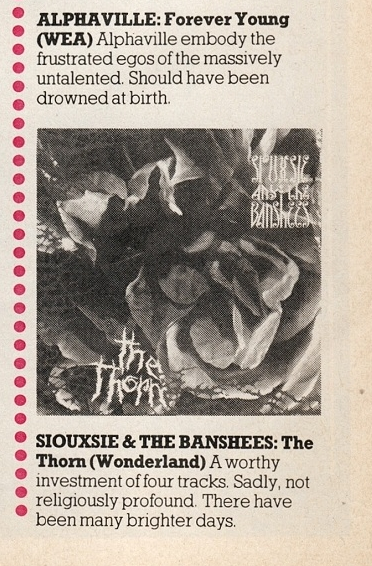
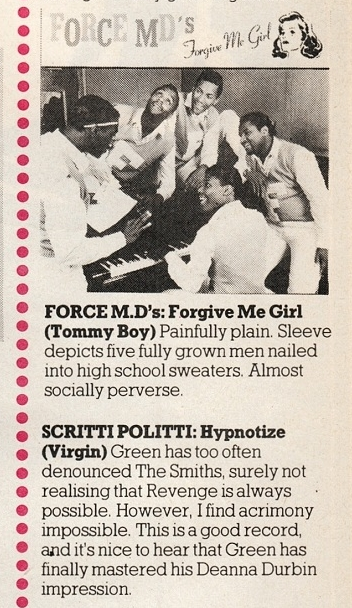
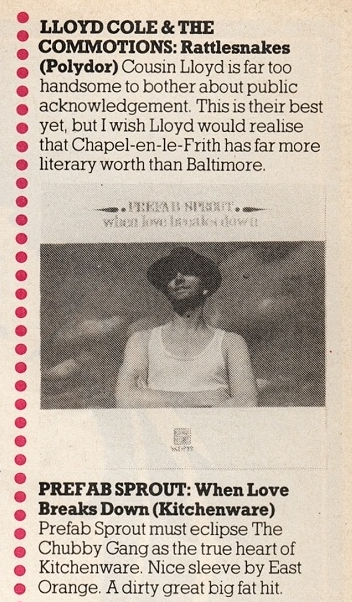
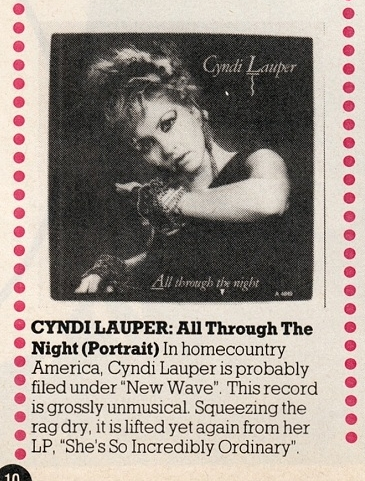
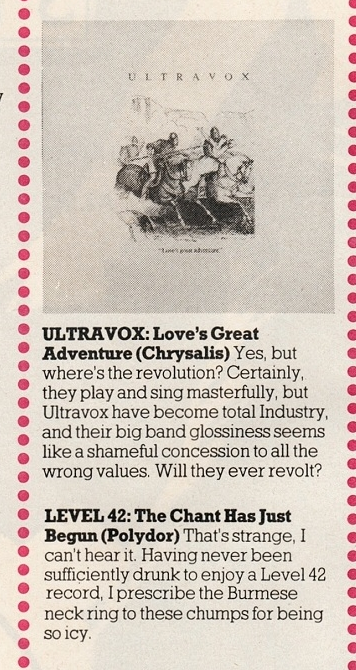

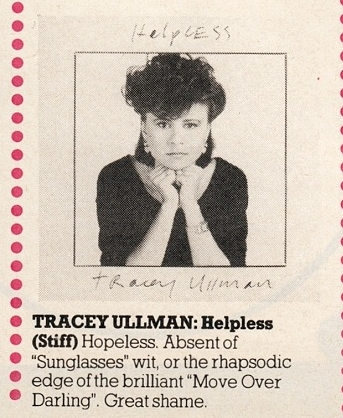
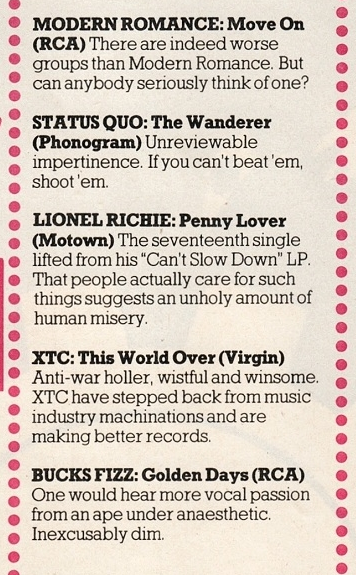
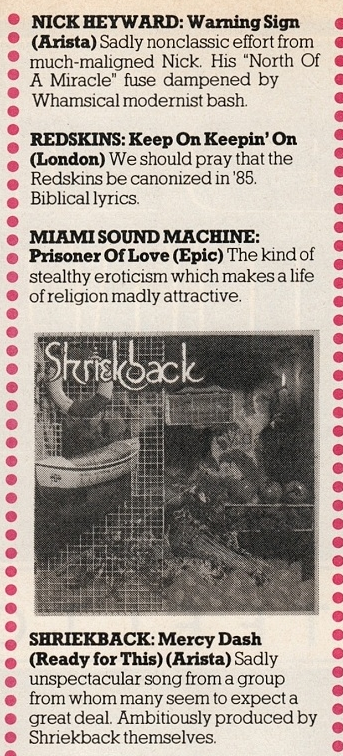

Spotter: Geek Tragedy
Morrissey Doesn’t Know Anyone… Who Would Like A Reunion of The Smiths
MORRISSEY, quite possibly the most tedious popstar ever created, is being all contrary again, giving withering looks and claiming that he doesn’t know a soul who wants a Smiths reunion.
Maybe that’s true because, in actual fact, he doesn’t have any friends or indeed, is surrounded solely by sycophants.
In an interview with Billboard, he said:
“I don’t know a single person who wants a Smiths reunion! But, no, there aren’t any bands I like to see again because your memory of them is how they were in their prime or at their best or at their most desperate, and you look to them to be someone that they no longer are.”
Read the rest of this entry »
1940: Hattie McDaniel’s Stirring Academy Award Winning Speech As The First Black Oscar Winner
ON February 29, 1940, Hattie McDaniel became the first African American to win an Academy Award, winning the Best Supporting Actress Oscar for giving life to Mammy, the Gone with the Wind house servant. Fay Bainter heralded McDaniel by telling the audience that the gong “opens the doors of this room, moves back the walls, and enables us to embrace the whole of America….”
Read the rest of this entry »
Shaken Not Stirred: Five Great Character Moments in the Roger Moore James Bond Era
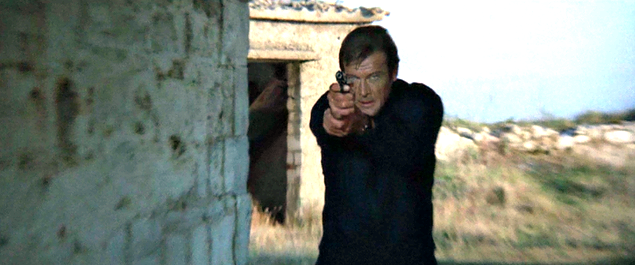
I VERY happily grew up with Sir Roger Moore in the role of Ian Fleming’s James Bond, and thus maintain a deep well of affection and nostalgia for his seven films…even if some Bond fans do not
Moore’s epoch as Agent 007 isn’t usually considered the most creatively fertile time in the franchise’s history, in part because the Bond films of the day pursued “hot” movie trends instead of initiating them, as had been the case in the 1960s.
To wit, the Bond movies of the Moore era attempted to jump on the bandwagon of Blaxploitation cinema (Live and Let Die [1973]), martial arts/Kung-Fu films (The Man with the Golden Gun [1974]), and even the Star Wars craze (Moonraker [1979]).
Despite the fact that Bond films of this time period seem desperate to pinpoint some — any — pop culture relevance, the Roger Moore efforts nonetheless boast some surprising character moments that could have been ripped straight from the novels…and Fleming’s literary descriptions of the character.
For instance, at least two films of the Roger Moore era (The Spy Who Loved Me and For Your Eyes Only) make explicit mention of the character’s tragic history — namely his dead wife, Tracy — a background that the last Connery film, Diamonds are Forever (1971) totally ignored.

Although it is undeniable that some James Bond films of the Roger Moore indeed tread heavily into unfortunate slapstick comedy (see: the pigeon doing a double-take at a gondola-turned-hovercraft in Moonraker), the actor’s finest moments in the famous role arrive not when he is called upon to play scenes broadly or cheekily, but rather when he is tasked with expressing Bond’s humanity.
Some of these “human” moments are small, even throwaway ones, but each one reminds the audience that 007 is not just a superhuman quipster in a white-dinner jacket. He’s still a man who bleeds, sweats, and struggles.
In chronological order then, here are five character moments from the James Bond Era of Roger Moore:
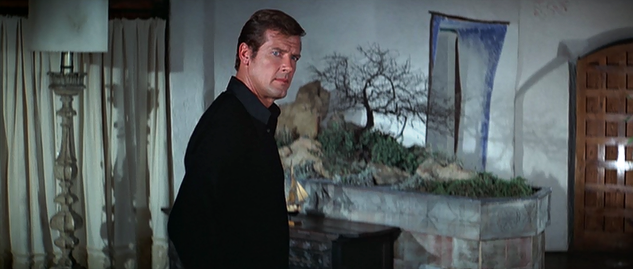
From The Spy Who Loved Me (1977): Bond talks to agent Triple XXX (Barbara Bach) about the fact that he murdered her lover.
The Spy Who Loved Me sees British and Russian intelligence join up to solve the mystery of several missing nuclear submarines. Britain’s finest, Bond, and Russia’s – XXX — join forces, and trace the missing subs back to a man named Stromberg (Curt Jurgen).
In a scene set in Sardinia, where Stromberg is headquartered, XXX confronts Bond about the fact that he may have murdered her lover three weeks earlier, on an unconnected assignment.
Bond turns away from XXX (and the audience), before he answers her accusation. Finally, he tells her that it’s hard to know who you kill when you’re racing on skis at 40 miles an hour…but yes, he did kill her lover. At this point, she informs Bond that after their mission is done, she will murder him.
This scene reminds the audience both of the constant danger in Bond’s profession, and its emotional toll upon him. Moore doesn’t rush the scene, or play it lightly. Instead, he takes his time with Bond’s response, giving us time to wonder how Bond will answer. It’s a balancing act for 007, because if he tells XXX the truth, their mission together will be imperiled. But he also feels he owes her the truth…so he gives it to her.
Bond’s sense of duty and moral code is on display in this scene, and Moore gets that aspect of the character absolutely right.
The longer that Bond is in the business of killing people, the more bodies will pile up, and the more angry spouses or family members he will be forced to confront. From this scene, we understand very clearly how Bond’s profession separates him from other people, even from other people in the spy business.
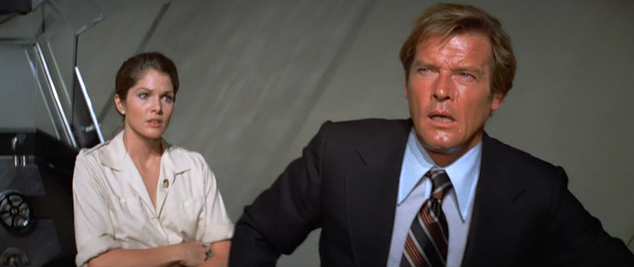
From Moonraker (1979): A rattled Bond — nearly pulped in a sabotage training centrifuge — pushes away Dr. Holly Goodhead (Loise Chiles) as she tries to help him.
This is an almost throwaway moment, but it occurs early in the 1979 film. Bond is visiting the complex of industrialist Hugo Drax (Michael Lonsdale), and Drax has secretly ordered that “some harm” come to him on a tour of the facility.
Dr. Holly Goodhead – secretly a CIA agent — convinces Bond to try out a training centrifuge, but then steps away, unwittingly leaving the villainous henchman Chang (Toshira Suga) to sabotage the machinery, and nearly kill Bond.
An apologetic Goodhead returns after Bond has disabled the deadly machine, and worriedly asks 007 what happened.
Instead of answering, he staggers out of the centrifuge, pushes her aside roughly, and is clearly pissed.
He doesn’t want to talk.
He doesn’t want to relate.
He’s angry, and this moment reveals that Moore’s Bond isn’t always suave or slick, or on the make. This is one of the few times in the Moore films that we see Bond genuinely ruffled, and knocked off-kilter.
In this moment, audiences see a hurt and angry Bond, one who momentarily rejects civility and who hasn’t yet restored his façade of charm.
It’s a telling — if brief — moment for the character. The ever-present mask of composure falls away.
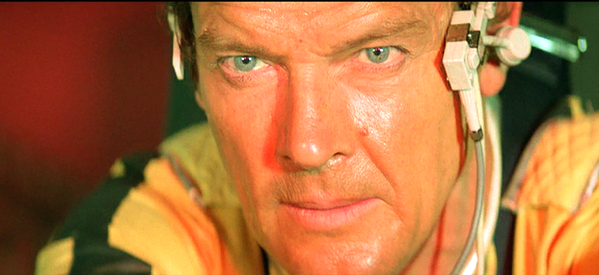
From Moonraker (1979): Bond saves 100,000 people from nerve gas…without quipping.
At the end of Moonraker, Bond and Goodhead board a space shuttle, Moonraker 5, and attempt to destroy three globes in Earth orbit.
If these globes re-enter the atmosphere, they’ll spew toxic nerve gas across whole continents. Bond destroys two without breaking a sweat, but can’t draw a bead on the third and final canister. He must switch to “manual” control to target it when things get rough.
Meanwhile, both the globe and the shuttle are making bumpy re-entry…
Now, on first blush, this moment might seem like a retread of Star Wars’ finale, with Luke Skywalker switching to manual control to lob two proton torpedoes into the Death Star vent.
But — wholly unexpectedly — this moment proves to the most suspenseful and tense of the entire film, which too often trends towards slapstick humor.
Moore has been accused of playing the 007 character “lightly,” but here he plays the character as hyper-focused and severe. Bond often carries the weight of the world on his shoulders, but he has never undertaken that task as literally as he does in Moonraker (1979), with whole populations imperiled. He has one shot to save the world, so he better make the most of it…
There are no quips, no smiles, and no trademark charm.
Instead, we get an extreme close-up of a tense man in action. Just lots of sweat and those piercing, laser-sharp blue eyes…

From For Your Eyes Only (1981): James Bond kicks a car off a cliff
For Your Eyes Only is far and away Roger Moore’s best Bond film, a grounded, action-packed follow-up to the outer space extravaganza of Moonraker. The film features many great action scenes, particularly the final mountain climbing set-piece, which endures as another masterpiece of escalating suspense.
But in terms of character moments, Moore gets a great one in this movie.
Near the end of For Your Eyes Only, he fights a merciless assassin, Locque (Michael Gothard). Locque has been killing agents and Bond’s allies throughout the whole film, and now Bond finally has him cornered, his car perched on the edge of a rocky cliff.
In his car, Locque panics at his precarious predicament, but things get worse when Bond approaches, and tosses him a keepsake: the “Dove” pin Locque left behind at several crime scenes.
Bond returns the pin to Locque….and then kicks the fucker’s car off the cliff.
Again, there’s nothing light or jokey about this moment. Bond is judge, jury and executioner, and he dispatches Locque with blunt, brutal finality. There are times for compassion and times for humor…and this isn’t one of them. Instead, Bond wordlessly metes out justice. He does so in one fluid movement.
This is the very moment, perhaps, when many Bond fans realized how ill-served Roger Moore had been by some of the Bond scripts. He was capable of being as tough, but rarely had the opportunity to flex that muscle. He shows here that he can capture Bond’s grace, and killer instinct…with perfect economy.

From Octopussy (1983): Bond explains to Octopussy (Maud Adams) how he treated her father.
In Octopussy, Bond travels to India and meets the mysterious smuggler called Octopussy on her private island. She asks him a question about an old case, and there’s every chance their meeting could go fatally wrong. Specifically, Octopussy asks if Bond remembers Major Dexter Smythe.
Bond does remember.
Turns out he was a British agent turned thief who Bond was tasked with bringing into custody. But instead of merely arresting the criminal, Bond gave the man twelve hours to get his affairs in order. Rather than be publicly disgraced, the major took his own life.
Octopussy is his daughter, and she is grateful that Bond gave Smythe time to consider his fate, and avoid public disgrace for his family.
Once more, we are confronted with Bond’s code of ethics. He may be licensed to kill and serve Her Majesty’s Secret Service but he’s not a monster, and when he goes into the field, he interprets orders, rather than simply obeying them. As I wrote above, there are times for compassion, and this story reveals such a time.
Again, Moore is particularly good in this scene because Bond is in a bind. Lie to avoid consequences? Or tell the truth and face them?
He picks the latter, and earns Octopussy’s respect for his honesty (as well as historical behavior). The message is that this Bond is a man of honor.
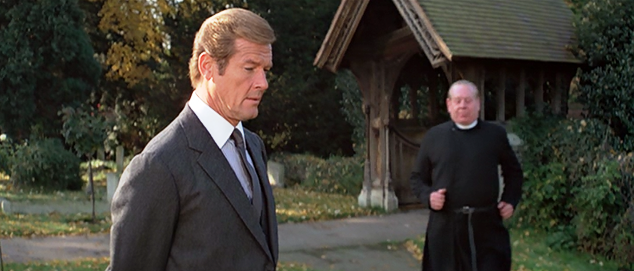
These days, the Bond films are serious, emotional affairs about a wounded warrior, and that’s all to the good. It’s easy to look back at the Bond films of the 1970s and decry them as being silly or inconsequential by comparison.
Many aspects of the films do fit that bill, but Sir Roger Moore was the 007 for my generation, and — in moments like the ones I enumerated above — I’m glad he was on the job.
Posted: 28th, February 2014 | In: Film, Key Posts | Comments (6)
Spike Lee Goes MENTAL About Brooklyn’s Gentrification
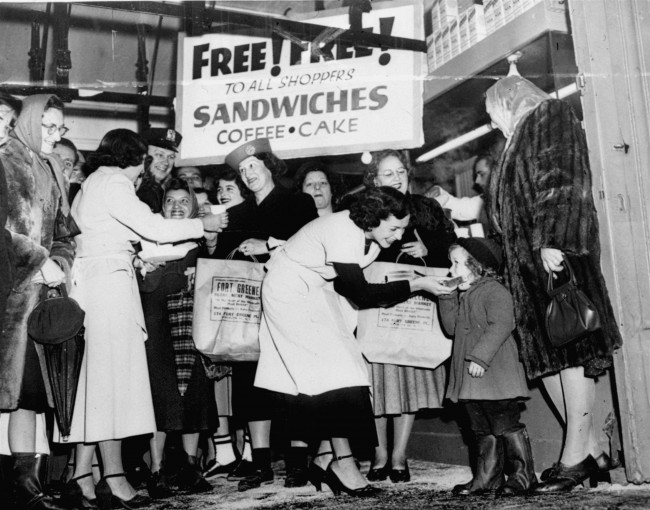
Hungry customers get coffee, sandwiches, and cake on the house at Fort Greene, retail market in Brooklyn, N.Y., January 27, 1949. Katherine O’Toole, three, receives a sandwich from Rena Kleiman as her mother does her shopping. Other buyers get theirs under the free for all sign. Date: 27/01/1949
EVERY city in the world follows the same pattern. Deprived area is cheap. All the artists move there and it gets hip. Hipsters follow the artists and the rents go up. The rents go up alongside the appearance of coffee houses and falafel bars. Formerly deprived area now no longer considered scummy, gets filled with wealthy web-designers and their awful children and no-one who originally lived in the area can afford the rent and has to move. They move to another scummy area and the cycle continues.
We all know this. This is always the way. However, Spike Lee doesn’t like it one bit.
Read the rest of this entry »
Posted: 28th, February 2014 | In: Celebrities | Comment
SXSW won’t let Lady GaGa play gig inside a vending machine
THE swines at the City of Austin have mystifyingly refused to allow Lady Gaga a permit to play in a giant Doritos vending machine at the SXSW festival.
The idiots.
Mother Monster had been all set to play at the festival’s Doritos Stage (gee whizz, what a crappy name) which is mocked up to look like a huge dispensing machine. However, the show will not go on thanks to concerns over public safety.
Like anyone should be concerned for the public’s safety at a festival. Seriously. All festival goers either willingly jeopardise their own well-being or, failing that, deserve everything they get.
Don Pitts of Austin’s Music And Entertainment division said: “Our conclusion was based primarily on public safety concerns… We look at the size and capacity of the location covered by the permit being sought and how it fits with the anticipated attendance, based on event capacity and promotion. At the end of the day, it’s a parking lot.”
Even better! A giant vending machine in a car park! With Lady GaGa in it! How great would that have been?
Of course GaGa can still play at the event, but only if she can find herself a location with “the necessary permanent infrastructure”. Presumably, the ground we all stand on is not necessarily permanent enough.



